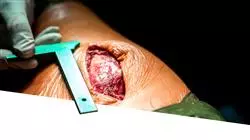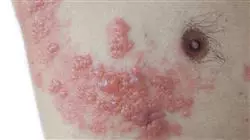University certificate
The world's largest faculty of medicine”
Introduction to the Program
Update your knowledge on the most prevelant Infectious Diseases with theoretical and practical information from a first-class teaching staff"

Emerging and re-emerging Infectious Diseases are of particular concern to global health. Dengue, Ebola or even Tuberculosis are some of the illnesses that have put health professionals around the world on alert, either due to the resistance they have built up, the threat of new outbreaks or the current lack of effective treatments.
All this has lead us to a situation where specialists and infectologists are on the front line in the battle to treat particularly delicate and complex cases. Fortunately, research into this area is constantly being carried out, and a multitude of new techniques and methodologies are being established in order to combat these adverse situations.
In response to this healthcare situation, TECH has brought together a team of specialists, researchers and high-level practitioners to offer a quality academic program in this field. In this Professional master’s degree, the teaching team has joined forces to bring together the most effective theoretical and practical knowledge on antibiotic therapies, differential diagnosis and prevention of Infectious Diseases .
Various modules on the syllabus have been prepared using a large amount of audiovisual material which has been created by the teachers themselves so as to provide a more adequate contextualization and justification for each of the subjects covered. Specialist will gain access to a virtual classroom with detailed videos, video summaries, self-knowledge exercises, research articles and complementary readings in order to deepen their understanding of those topics which are of greatest interest.
The completely online format of the program will also provide a level of flexibility which will enable students to balance this academic study with any kind of professional activity. They will be able to access the virtual classroom at any time from any device with an Internet connection, and can also download the contents for offline study at a later date.
Access the most recent findings in the treatments and approaches to infectious diseases with practical studies that you will be able to incorporate into your daily work”
This Professional master’s degree in Infectious Diseases contains the most complete and up-to-date scientific program on the market. The most important features include:
- Clinical cases presented by experts in infectious diseases
- The graphic, schematic, and practical contents with which they are created, provide scientific and practical information on the disciplines that are essential for professional practice
- Practical exercises where self-assessment can be used to improve learning
- Special emphasis on innovative methodologies
- Theoretical lessons, questions to the expert, debate forums on controversial topics, and individual reflection assignments
- Content that is accessible from any fixed or portable device with an Internet connection
By downloading all the content from the virtual classroom you will have access to a unique reference guide in the field of infectious diseases, which will be indispensible to you even after completing the program"
The program’s teaching staff includes professionals from sector who contribute their work experience to this program, as well as renowned specialists from leading societies and prestigious universities.
The multimedia content, developed with the latest educational technology, will provide the professional with situated and contextual learning, i.e., a simulated environment that will provide immersive training programmed to learn in real situations.
This program is designed around Problem-Based Learning, whereby the professional must try to solve the different professional practice situations that arise throughout the program. For this purpose, the student will be assisted by an innovative interactive video system created by renowned and experienced experts.
You will be able to deepen your understanding of the topics you are most interested in thanks to the extensive collection of documents and complementary readings compiled by the TECH’s teaching team"

You won’t have to adhere to fixed schedules or attend face-to-face classes. Choose where, when and how to take on the workload"
Why study at TECH?
TECH is the world’s largest online university. With an impressive catalog of more than 14,000 university programs available in 11 languages, it is positioned as a leader in employability, with a 99% job placement rate. In addition, it relies on an enormous faculty of more than 6,000 professors of the highest international renown.

Study at the world's largest online university and guarantee your professional success. The future starts at TECH”
The world’s best online university according to FORBES
The prestigious Forbes magazine, specialized in business and finance, has highlighted TECH as “the world's best online university” This is what they have recently stated in an article in their digital edition in which they echo the success story of this institution, “thanks to the academic offer it provides, the selection of its teaching staff, and an innovative learning method aimed at educating the professionals of the future”
A revolutionary study method, a cutting-edge faculty and a practical focus: the key to TECH's success.
The most complete study plans on the university scene
TECH offers the most complete study plans on the university scene, with syllabuses that cover fundamental concepts and, at the same time, the main scientific advances in their specific scientific areas. In addition, these programs are continuously being updated to guarantee students the academic vanguard and the most in-demand professional skills. In this way, the university's qualifications provide its graduates with a significant advantage to propel their careers to success.
TECH offers the most comprehensive and intensive study plans on the current university scene.
A world-class teaching staff
TECH's teaching staff is made up of more than 6,000 professors with the highest international recognition. Professors, researchers and top executives of multinational companies, including Isaiah Covington, performance coach of the Boston Celtics; Magda Romanska, principal investigator at Harvard MetaLAB; Ignacio Wistumba, chairman of the department of translational molecular pathology at MD Anderson Cancer Center; and D.W. Pine, creative director of TIME magazine, among others.
Internationally renowned experts, specialized in different branches of Health, Technology, Communication and Business, form part of the TECH faculty.
A unique learning method
TECH is the first university to use Relearning in all its programs. It is the best online learning methodology, accredited with international teaching quality certifications, provided by prestigious educational agencies. In addition, this disruptive educational model is complemented with the “Case Method”, thereby setting up a unique online teaching strategy. Innovative teaching resources are also implemented, including detailed videos, infographics and interactive summaries.
TECH combines Relearning and the Case Method in all its university programs to guarantee excellent theoretical and practical learning, studying whenever and wherever you want.
The world's largest online university
TECH is the world’s largest online university. We are the largest educational institution, with the best and widest online educational catalog, one hundred percent online and covering the vast majority of areas of knowledge. We offer a large selection of our own degrees and accredited online undergraduate and postgraduate degrees. In total, more than 14,000 university degrees, in eleven different languages, make us the largest educational largest in the world.
TECH has the world's most extensive catalog of academic and official programs, available in more than 11 languages.
Google Premier Partner
The American technology giant has awarded TECH the Google Google Premier Partner badge. This award, which is only available to 3% of the world's companies, highlights the efficient, flexible and tailored experience that this university provides to students. The recognition as a Google Premier Partner not only accredits the maximum rigor, performance and investment in TECH's digital infrastructures, but also places this university as one of the world's leading technology companies.
Google has positioned TECH in the top 3% of the world's most important technology companies by awarding it its Google Premier Partner badge.
The official online university of the NBA
TECH is the official online university of the NBA. Thanks to our agreement with the biggest league in basketball, we offer our students exclusive university programs, as well as a wide variety of educational resources focused on the business of the league and other areas of the sports industry. Each program is made up of a uniquely designed syllabus and features exceptional guest hosts: professionals with a distinguished sports background who will offer their expertise on the most relevant topics.
TECH has been selected by the NBA, the world's top basketball league, as its official online university.
The top-rated university by its students
Students have positioned TECH as the world's top-rated university on the main review websites, with a highest rating of 4.9 out of 5, obtained from more than 1,000 reviews. These results consolidate TECH as the benchmark university institution at an international level, reflecting the excellence and positive impact of its educational model.” reflecting the excellence and positive impact of its educational model.”
TECH is the world’s top-rated university by its students.
Leaders in employability
TECH has managed to become the leading university in employability. 99% of its students obtain jobs in the academic field they have studied, within one year of completing any of the university's programs. A similar number achieve immediate career enhancement. All this thanks to a study methodology that bases its effectiveness on the acquisition of practical skills, which are absolutely necessary for professional development.
99% of TECH graduates find a job within a year of completing their studies.
Professional Master's Degree in Infectious Diseases
Despite scientific advances, infections account for 25% of deaths worldwide. This figure makes clear the need for physicians specialized in their treatment through a course dedicated to nosocomial infections as this online Master we have developed in TECH and that covers antimicrobial treatment and infectious diseases with rigor and depth, always from a practical approach based on the latest scientific evidence.
Take a Professional Master's Degree in Infectious Diseases
Infections related to health care are a reality that must be faced from the knowledge of the microorganisms that generate them, but also of the drugs that cause failures in the immune system of patients. The high degree of specialization required to understand them can only be achieved through this postgraduate course, which will allow you to gain in-depth knowledge of the techniques and strategies that reduce nosocomial infections, from early recognition of the symptoms to the treatments that can be applied to combat them safely.
Study a Professional Master's Degree in Medicine online
By studying this postgraduate course you will be training without giving up your other personal activities or work. This is possible thanks to our virtual methodology, which allows you to study at the time you prefer and from your own home. In addition, it will help you to advance professionally, in order to access more specialized and better paid jobs. Opt for this program and give your career an essential promotion!







